The last of the herring men
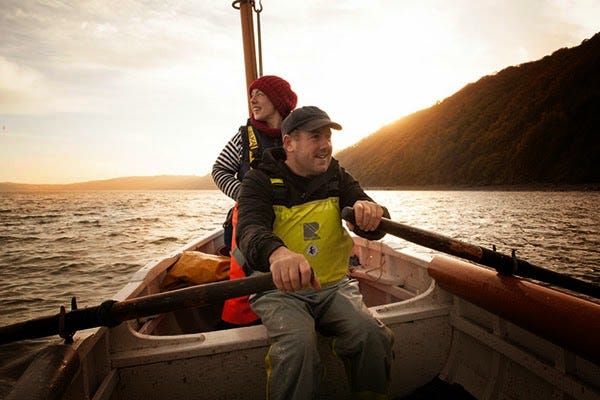
Herring means Christmas to me
Fishing in a traditional and sustainable way, is decaying and it is becoming increasingly harder to make a living from a small fishing boat.
In November I visited my friend Stephen Perham, the last of the Clovelly Herring men.
Also the Clovelly Harbourmaster, he is the only fisherman still living in the village and the only one who sells his catch. One of the very few others is Tommy who is Stephen’s brother, but he doesn't live in the village anymore.
Stephen lives with his betrothed Joy in his grandmother's house, she's a singer in the Fishwives Choir, lifeboat volunteer, and trainee doctor. His sister Rachel lives next door, in the house their father and mother lived and died in, like many before them. These houses are full of stories and ghosts of the past. His family is with us when we sit around the table in his kitchen, drinking port by the warming old Rayburn that's drying tea towels and three beloved soggy dogs.
Pictures of his ancestors and other long lost locals are found everywhere in his fisherman's cottage and I’m told there are many more, as the old folk of the village have often left their old family photos to him when they died. Joy, very much amused, pointed towards a Clovelly souvenir plaque in their kitchen, showing a small lad on the cobbled street. "Guess who the little boy is?"
He is the last of the herring men of Clovelly, the last link between the old and the new; he is the one who keeps all those long lost souls alive, the keeper of hundreds of years of memories.
Even when visiting the local pub in Clovelly, we find a lingering echo of Stephen and Tommy's ancestors. The pictures on the wall of the snug bar tell the story of a Clovelly long gone, of fishermen gathering around the table smoking pipes and pictures of the most beloved wooden boats, of which only a few still remain in the harbour. These boats are unique to Clovelly and built to get out to sea faster than the larger boats when the herring arrives.
Stephen in his Picarooner, a wooden boat unique to Clovelly
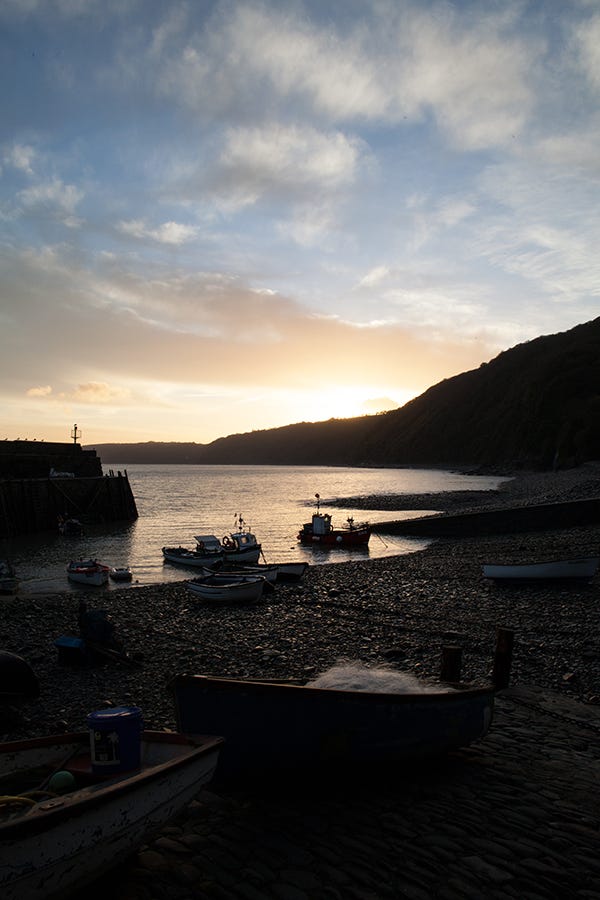
The harbour at dawn
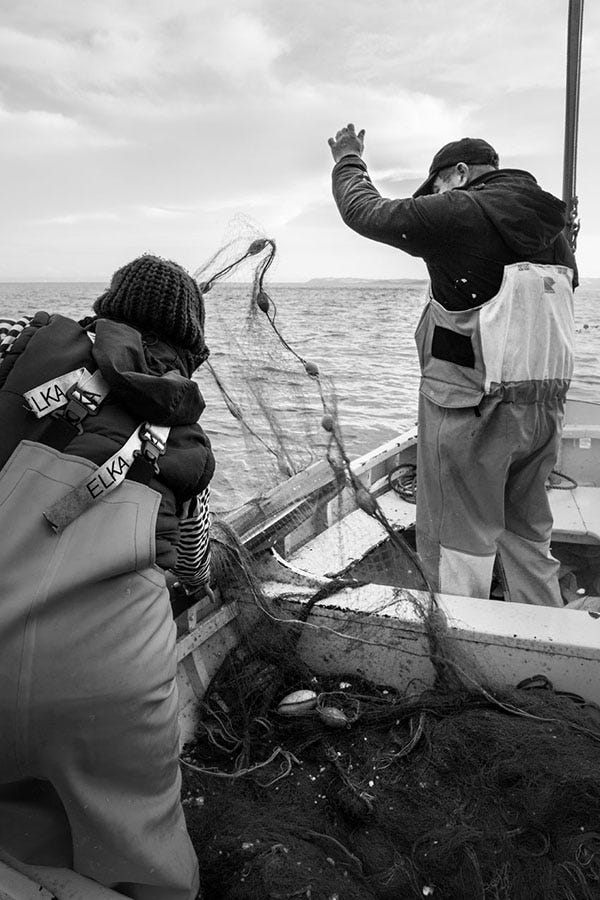
Traditional sustainable fishing methods that haven't changed for centuries
Clovelly as a community, like many other similar coastal villages, once depended on the herring trade. Records show that two hundred years ago there were a hundred herring boats in the harbour with amounts around nine thousand herrings or ‘Silver Darlings’ brought in from sea. The days of the large herring fleet are long gone and today there are just a few fishermen who still go out for the herring, using sustainable fishing methods with drift nets.
Meeting Stephen, you immediately understand why the town's herring festival each november isn’t just another food festival - it is a celebration of tradition and heritage, his heritage. Stephen is a 6th generation Clovelly herring fisherman, and with him and his brother, sadly, the line is very likely to end.
This proud and gentle-natured fisherman is the essence of this little village; he and his family represent the past and the future. He knows all the stories - where which boat got shipwrecked and who survived or was lost to the sea. He can read the waves, the sky and the sound that the rain makes when it hits the water. Fishing is in his blood, and fishing for herring is his passion as it has been associated with his family and this little village for centuries. As harbourmaster and the last full-time fisherman in the village, he knows where every boat is at any given moment and, although it is hard to sell herring these days -it is now a fish which is unjustifiably out of fashion- he continues to go out for herring because it is what he genuinely loves to do.
The fish he doesn’t sell, or eat himself, he salts down in barrels to use as bait. In the summer months he goes out to sea for lobster and crabs. To do this he needs bait, and the herring provides that. He needs a dozen barrels to get through the summer and with the number of herring being so plentiful, he usually only goes out for herring once or twice a week to fulfil orders after the herring festival ends.
Life by the sea was so different in the old days; nearly all the men in the village were employed in herring fishing up until the 20th century. In the past, fishermen had to move away from their beloved little coastal town with its steep hills and cobbled lanes during the summer when there was no herring to be caught. They would work on the Royal Yachts further away but by the time the herring returned to these pebbled shores they would be home. The season of the Silver Darling runs from Michaelmas to Christmas and that’s why for Stephen “herring means Christmas”. It’s the build-up to Christmas, his favourite time of the year. He says once you get to Christmas it is all about the food, the puddings and the cakes. This fisherman loves to cook.

Right: Stephen and Tommy's ancestors on the wall of the village pub
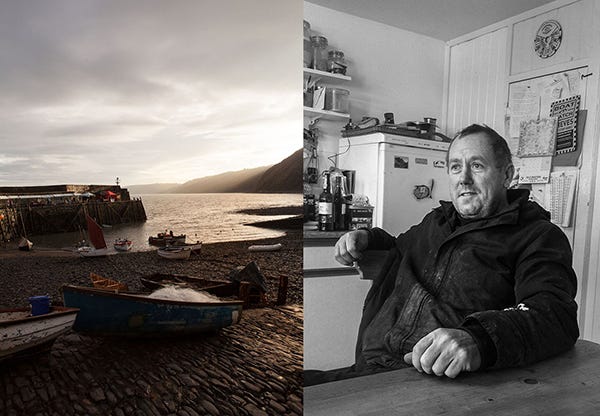
Stephen looking out over the harbour from his kitchen, nothing happens without him knowing about it
Left: The large herring fleet of the past. Right: One of the last of the fleet today.
His passion for herring and the traditional methods of catching them made him think about how he could try and put herring back on the map. The Clovelly Herring Festival was originally the brainchild of Stephen, Bob Rouse and Sue Haworth, who both work for Clovelly Estate, and the author of the well acclaimed book about the history of herring fishing, Mike Smylie. Smylie, as a maritime historian, has done a great deal for the fishing industry, and the herring industry in particular, trying to record the traditions of a dying industry that for years had fed the nation. He and Stephen met when BBC Radio 4 introduced the two in a program about Smylie's herring book and they have been friends ever since.
Mike Smylie comes down to the Herring Festival each year with his self-made herring smoker, which looks like an old outdoor loo. He believes that people went off smoked herring due to the usage of artificial dyes to speed up the smoking process of kippers during WW2. It is also a rather sad fact that people have become so used to buying ready filleted fish that they have lost the knowledge of either boning a fish or even just eating it straight from a hot pan from the bone. Herring contains a larger bone and tiny little long bones which you can actually just eat. These little harmless bones had provided the people with much needed extra calcium in the past.

Joy goes out to sea with Stephen whenever she can.
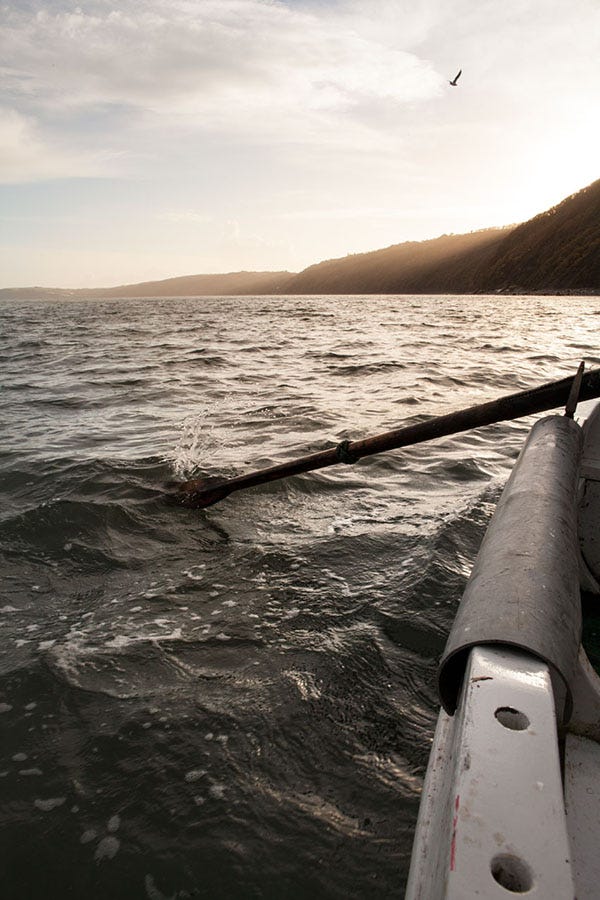

Herring was plentiful until stocks collapsed in the 1970s. Smoking herring into kippers or salting it down in barrels, either for bait or consumption, had always been the most common way the herring was processed. That way it could be kept for longer and transported further inland. As herring was a main food source it became a staple during the war. The ‘herring ban’ in 1976 caused the closure of the Celtic and the North Sea fisheries and it lasted until 1983.
Stephen Perham and his brother Tommy were growing up during the herring ban and his father taught them the ropes of the trade by drawing diagrams in the salt of the windows of his house. Unfortunately their father died a year before the ban was lifted, but Stephen has been fishing for herring ever since.
The extraordinary thing about Stephen's method of fishing is that it hasn’t changed one bit from how his ancestors did it. The boat is still the same type of small 16 ft wooden ’Picarooner’ his forebears used, nicely painted white every year and finished off with a pretty red rim. The nets are also still the same design, although they are now made of nylon rather than cotton. The only thing that has really changed is the demand for this beautiful silver fish. The big markets like Brixham and Plymouth just aren’t interested in herring any more.
A lonely 'Picarooner', a wooden herring boat unique to Clovelly
It's not difficult to see why these shiny fish are nicknamed 'The Silver Darling'
Stephen shows me that the herring scales are everywhere. The boat looks like it is embellished.
Luckily a food festival, like the Herring Festival in Clovelly, puts a healthy, oily fish like herring back in the spotlight and onto the menu. Not only does the food festival offer a number of stalls selling herring delights traditional and more exotic, there is fresh herring to take home, and there are also several stalls selling other local produce. I was on hand this year to help Stephen and Joy sell their lobster rolls, which we lovingly prepared that morning. Perham herring, which is how Stephen and Tommy call their beloved fish, was celebrated and enjoyed by many for this one whole day. But it should be on our plates more often.
Rick Stein and Marco Pierre White have both come down to Clovelly in recent years to fight the corner of the herring. And it deserves saving. Clearly herring is a versatile fish; it is gorgeous fresh, but just as good smoked into kippers, simply baked in plenty of butter or cured into rollmops. A fish abundant and healthy, we should eat it more to support small scale fishermen who catch these little fish in a sustainable way and support carefully managed fishing. But, foremost, we should eat this fish because it is good for us.
If there is one thing I've learnt on my few days with Stephen and Joy, it is the importance of heritage. Traditional sustainable herring fishing is under threat to be lost. Fishermen have difficulties to sell their catch so have to try and find other ways to sustain themselves and their families, or move away from their villages and learn a different trade. Their quaint fishermen's cottages are turned into holiday homes and their boats into flower beds. But Stephen is sure he isn't the only one who's at the end of a line of fishermen, there are other fishermen in other coastal villages who are also trying to hang on to a small scale sustainable method of fishing. His dream is to take to sea with the small wooden boat, he lovingly named 'Little Lilly' and visit those other fishermen, and write down their stories like I am writing down his today. For Stephen it is important that these old traditional methods, and the names of those who keep it alive, are noted down somewhere, so that they aren't forgotten and lost. So that their heritage doesn't rot away, like the old boats do on the beaches all round the British coast.
I hope that Stephen can sell enough of his catch to go on his trip. Because it is an important work to write, and one I would love to read.
Joy and Stephen when I first met them two years ago in the summer, with their catch of mackerelWhen I was visiting them my friend Sassy and I also shot a little video when we went fishing for herring with them. I hope you'll like it!
I've uploaded it to my new Youtube Channel, don't forget to subscribe :)
The Herring Festival takes place on the second Sunday of November each year, and is organised by the private owners of Clovelly village, the Clovelly Estate Company.



